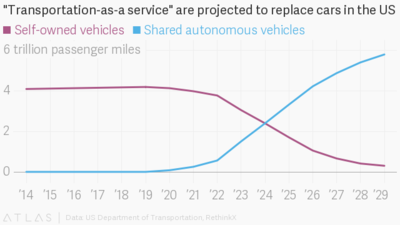Bob Lutz Confirms The Auto Channel's Vision On The Possible Demise of The Auto Industry
SEE ALSO: Autonomous Driving May Kill The Automobile Industry And Our Freedom Of Mobility
Michael J. Coren writing for MSN COMPLETE ARTICLE) reported in an interview with Bob Lutz the ultimate car guy that it’s not every day a titan of industry predicts the demise of his own. But Bob Lutz, the former chairman of General Motors, believes the auto industry is not long for this world.
“It saddens me to say it, but we are approaching the end of the automotive era,” he writes this month for Automotive News. Our daily travel, he predicts, will migrate to standardized passenger modules as the demolition of the traditional auto industry accelerates. Within five years, he expects, people will start selling their cars for scrap or trade then in for autonomous passenger modules as self-driving cars take over transportation. Within 20 years, human-driven vehicles will be legislated off highways. Companies like Lyft, Uber, Google and other technology companies will take charge of an industry now centered in Detroit, Germany, and Japan.
“The end state will be the fully autonomous module with no capability for the driver to exercise command,” he writes. “You will call for it, it will arrive at your location, you’ll get in, input your destination and go to the freeway.”
Fleet owners like FedEx and UPS will be the first to defect to self-driving vehicles. Cost savings from autonomous (likely electric) vehicles are just too great. Others have predicted the same thing: RethinkX, a Bay Area think tank, expects shared autonomous electric vehicles will account for almost all road travel by 2030 thanks to their low maintenance and fuel costs, as well as their ability to work around the clock.
Lutz started his automotive career at GM in 1963, then went on to have senior leadership roles with BMW, Ford, and Chrysler until retiring in 2010. His view of legacy car companies is nothing short of apocalyptic.
He predicts the companies that actually manufacture cars will become less valuable as the importance of those that own fully autonomous fleets grows. Expect the relationship between companies like Ford and Uber to resemble the one between Foxconn and Apple: manufacturing companies make products in obscurity, while technology companies grab most of the visibility and profits. Premium-car makers and dealerships are doomed. As transportation is commodified into an on-demand service, the market for individually owned cars will shrink, and be kept afloat by only a few car fanatics.
This death sentence could be premature, argues Sven Beiker, who spent 13 years at BMW before joining Stanford University. The auto industry that has anchored the US economy for generations with about 4 million jobs from manufacturing to retail in the US, and as much as $953 billion in economic activity. Its transformation will not happen overnight.
“Typically, we extrapolate a lot: I know what an automobile is, therefore I know what an autonomous car is,” he says. “That’s just not true.” Silicon Valley’s tech giants, while adept at bits and bytes, have not yet proven themselves as successful at rearranging atoms for something as large and sophisticated as a car. Even Tesla, Silicon Valley’s standout in the industry, has only manufactured about 250,000 vehicles during its 14-year lifetime. Volkswagen, Toyota, and GM each sell about 10 million cars per year.



